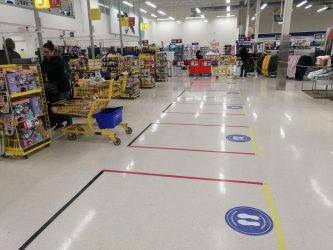
COVID-19 may be affecting the world, but there are some distinctive differences in the ways that nations are handling the outbreak and the impacts it is having.
Here, New Food speaks to the Marc Fortin, President and CEO at RCC-Quebec/CCCD-
"The federal and provincial governments are responding swiftly and rapidly," Fortin said. "They are investing into various economical programmes to support businesses and individuals to avoid a complete meltdown of the economy after COVID-19 has passed."
He explained that
"The school break was around one week before the travel ban" he continued, "meaning citizens were travelling all over and coming back to 
Similarly to the
Canada is also encouraging regular hand washing with designated sanitising points, which are placed between the inside and outside doors of store interiors.
"Employees are afraid of contracting coronavirus; they want to stay home and benefit from the federal support programme," Fortin added. "This has created a shortage of workers across the supply chain, which, again, is impacting our food and beverage systems."
Panic buying and shortages
Canada is witnessing huge orders from consumers of certain items, including flour, canned meat and fish, vegetables, pasta, rice and chocolate chips. Not to mention the bizarre global toilet roll phenomenon. However, it is eggs which appear to be most in demand.
Fortin suggests the shortages of flour, eggs and chocolate chips are due to a rise in baking among Canadians. The increase in home baking is not unique to Canada, with the
Fortin continued: "There was a second wave of pressure on supermarket shelves following the closure of restaurants, with the demand redirected entirely to retailers. The US border is also under pressure because a lot of our produce is shipped through there. For example, much of our fresh fruit and vegetables in the winter come from
"Supplies of locally-grown produce such as
"We'll have less choice, but we are not expecting big shortages…as long as
If transportation remains limited, Fortin envisions that the government will encourage those on welfare to work in the field.
"We might see some increased costs because the Canadian dollar is down versus the US dollar; it will increase the costs of imported raw materials, seeds, fertilisers, fresh produce and finish goods," he continued. "We may also experience a loss in efficiency due to social distancing measures on farm."
However, the most concerning aspect for Fortin is how long this pandemic will last and what long-term affects it will have. "When the winter comes we rely more on imports, but will everything be back on track or will we see countries losing their summer season? It's something that no one can predict."
The future
“Moving forwards, we need to look at the supply chain, identify where we rely on others and where we can be self-dependent,” Fortin confirmed.
"We have witnessed a lot of produce falling to waste that was intended for restaurants; we have begun to compile a list of suppliers by category which we are sharing with our members. It means that they can reach out to these suppliers and have their produce redirected to their stores. It was a nice learning curve, which demonstrated how important local produce is. It made us look for novel methods whereby we can work together and support the ecosystem. I believe the local movement is going to grow.
"We are also looking at how technology can help improve online systems, since seeing a rise in Internet orders and delivery dates that are too far away. Members are going through the evaluation as we speak, with a focus on managing day-to-day."
One solution he mentioned was the use of robots within the warehouse to improve efficiency - a technology which already exists and could be implemented to increase the speed of order marking and delivery to store. Plus, as Fortin pointed out, robots do not contract COVID-19.
Of course, humans will still be required in the warehouse, for example robots cannot currently be used to 'pick and pack', so it would be more of a case of looking at how the two (robots and humans) can complement each other in the future.
Biography

© Russell Publishing Limited, 2020. All Rights Reserved., source


